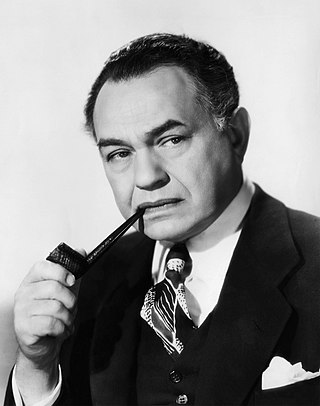
Edward G. Robinson was an American actor of stage and screen, who was popular during Hollywood's Golden Age. He appeared in 30 Broadway plays, and more than 100 films, during a 50-year career, and is best remembered for his tough-guy roles as gangsters in such films as Little Caesar and Key Largo. During his career, Robinson received the Cannes Film Festival Award for Best Actor for his performance in House of Strangers.
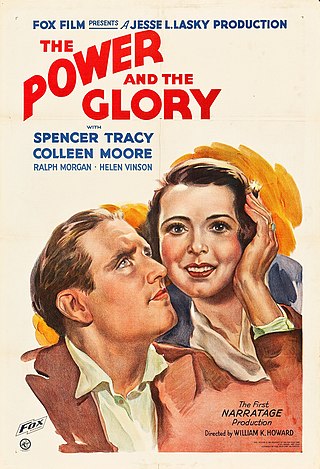
The Power and the Glory is a 1933 pre-Code film starring Spencer Tracy and Colleen Moore, written by Preston Sturges, and directed by William K. Howard. The picture's screenplay was Sturges' first script, which he delivered complete in the form of a finished shooting script, for which he received $17,500 and a percentage of the profits. Profit-sharing arrangements, now a common practice in Hollywood, were then unusual and gained Sturges much attention.
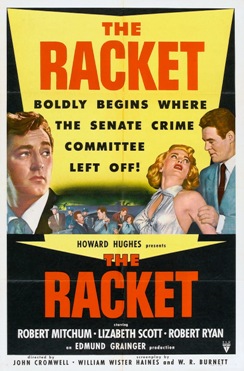
The Racket is a 1951 black-and-white film noir drama directed by John Cromwell with uncredited directing help from Nicholas Ray, Tay Garnett, and Mel Ferrer. The production features Robert Mitchum, Lizabeth Scott, Robert Ryan, and William Conrad. Future Perry Mason regular cast members William Talman and Ray Collins appear in key roles.

Blackmail is a 1939 American crime drama film directed by H. C. Potter and starring Edward G. Robinson, Ruth Hussey and Gene Lockhart.
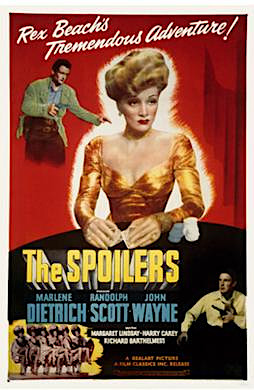
The Spoilers is a 1942 American Western film directed by Ray Enright and starring Marlene Dietrich, Randolph Scott and John Wayne.

Helen Vinson was an American film actress who appeared in 40 films between 1932 and 1945.
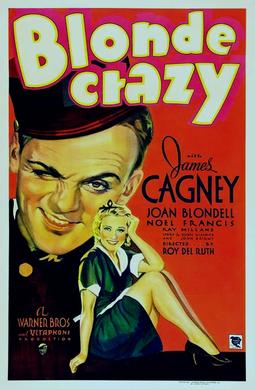
Blonde Crazy is a 1931 American pre-Code romantic comedy-drama film directed by Roy Del Ruth and starring James Cagney, Joan Blondell, Noel Francis, Louis Calhern, Ray Milland, and Guy Kibbee. The film is notable for one of Cagney's lines, a phrase often repeated by celebrity impersonators: "That dirty, double-crossin' rat!"

The Sea Wolf is a 1941 American adventure drama film adaptation of Jack London's 1904 novel The Sea-Wolf with Edward G. Robinson, Ida Lupino, John Garfield, and Alexander Knox making his debut in an American film. The film was written by Robert Rossen and directed by Michael Curtiz.

The Whole Town's Talking is a 1935 American comedy film starring Edward G. Robinson as a law-abiding man who bears a striking resemblance to a killer, with Jean Arthur as his love interest. It was directed by John Ford from a screenplay by Jo Swerling and Robert Riskin based on a story by W.R. Burnett originally published in Collier's in August 1932. Burnett was also the author of the source material for Robinson's screen break-through, Little Caesar. The film The Whole Town's Talking (1926) has no story connection to this film.
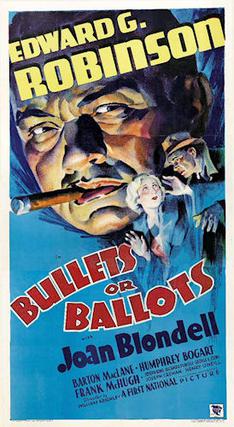
Bullets or Ballots is a 1936 American gangster film starring Edward G. Robinson, Joan Blondell, Barton MacLane, and Humphrey Bogart. Robinson plays a police detective who infiltrates a crime gang. This is the first of several films featuring both Robinson and Bogart.
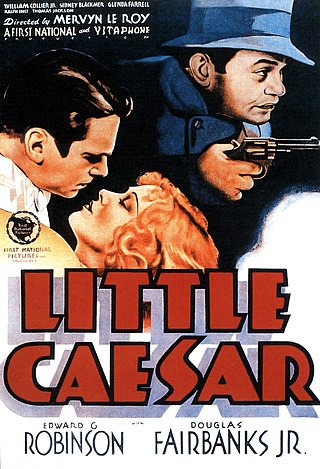
Little Caesar is a 1931 American pre-Code crime film distributed by Warner Brothers, directed by Mervyn LeRoy, and starring Edward G. Robinson, Glenda Farrell, and Douglas Fairbanks Jr. In 2000, Little Caesar was included in the annual selection of 25 motion pictures added to the National Film Registry of the Library of Congress being deemed "culturally, historically, or aesthetically significant" and recommended for preservation. The film tells the story of a hoodlum who ascends the ranks of organized crime until he reaches its upper echelons. The storyline, based on real life Mafia boss Salvatore Maranzano, was adapted from the novel of the same name by William R. Burnett. Little Caesar was Robinson's breakthrough role and immediately made him a major film star. The film is often listed as one of the first fully-fledged gangster films and continues to be well received by critics. The Library of Congress maintains a print.
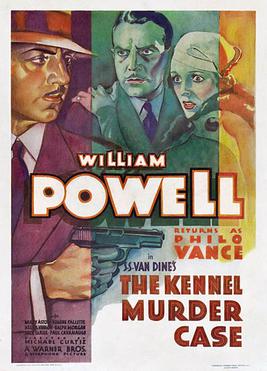
The Kennel Murder Case is a 1933 American pre-Code mystery film adapted from the 1933 novel of the same name by S. S. Van Dine. Directed by Michael Curtiz for Warner Bros., it stars William Powell and Mary Astor. Powell's role as Philo Vance is not the actor's first performance as the aristocratic sleuth; he also portrays the character in three films produced by Paramount in 1929 and 1930.
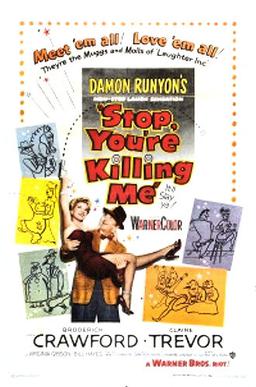
Stop, You're Killing Me is a 1952 American black comedy film directed by Roy Del Ruth and starring Broderick Crawford, Claire Trevor and Virginia Gibson.

The Man with Two Faces is an American drama film directed by Archie Mayo, and starring Edward G. Robinson and Mary Astor. The supporting cast features Ricardo Cortez, Louis Calhern, Mae Clarke, and David Landau. The story was adapted by Tom Reed and Niven Busch from the play The Dark Tower by George S. Kaufman and Alexander Woollcott.

The Bright Shawl is a 1923 American silent historical drama film directed by John S. Robertson and produced by and starring Richard Barthelmess. This film, based on a novel by Joseph Hergesheimer, had several days of filming on location in Cuba. It features the first confirmed film appearance of Edward G. Robinson.
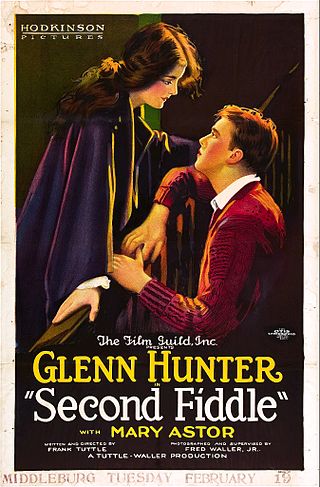
Second Fiddle is a 1923 American silent comedy-drama film directed by Frank Tuttle and distributed by W. W. Hodkinson. It stars Glenn Hunter and has an early appearance in a lead role by actress Mary Astor.
New Year's Eve is a lost 1929 sound film drama produced and distributed by Fox Film Corporation and starring Mary Astor and Charles Morton. While the film has no audible dialog, it was released with a synchronized musical score with sound effects using the sound-on-film movietone process. Veteran Henry Lehrman, who had worked with Mack Sennett and Charlie Chaplin, was the director. Samuel L. Rothafel wrote the music for film. As was the case for the majority of films during the early sound era, a silent version was prepared for theatres who had not yet converted to sound. Max Gold was an assistant director.

Five Little Peppers in Trouble is a 1940 American black and white comedy-drama film. It was the last Five Little Peppers film.

Smart Woman is a 1931 pre-Code comedy-romance and drama film directed by Gregory La Cava and starring Mary Astor, Robert Ames, and John Halliday.

The Widow from Chicago is a 1930 American pre-Code crime drama film directed by Edward F. Cline and starring Alice White, Edward G. Robinson, Neil Hamilton, and Frank McHugh. It was released by First National Pictures, a subsidiary of Warner Bros. Planned as a full-scale musical, the songs were cut from the film before release due to the public's aversion for musicals.



















